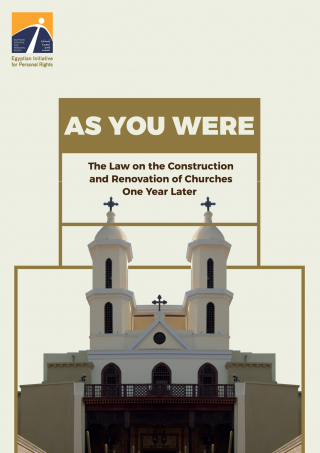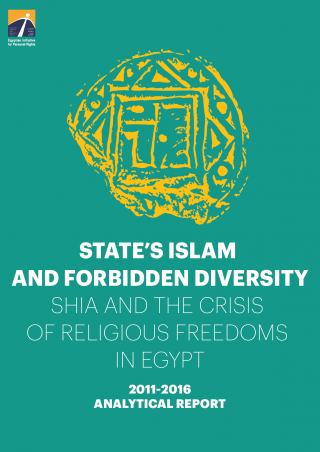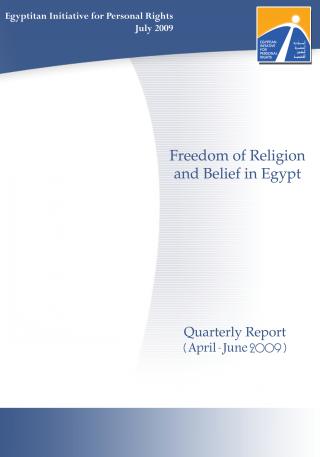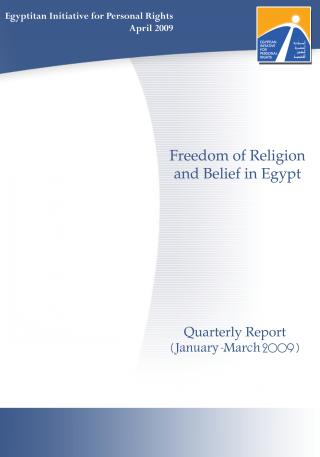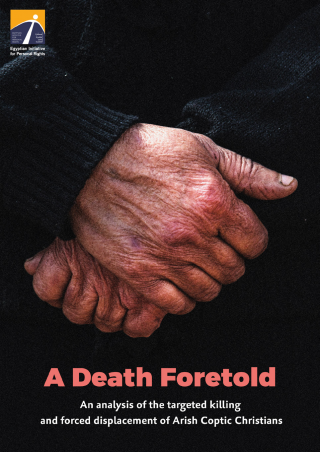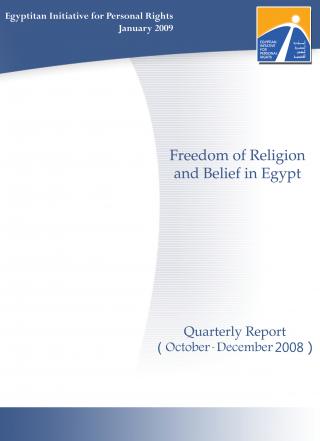The Egyptian Initiative for Personal Rights (EIPR) today issued its second quarterly report on freedom of religion and belief in Egypt, documenting developments in the area of religious freedom during the months of April, May and June of 2008.
Search
Introduction
On September 28, 2016, Law 80/2016 was adopted to regulate the construction and renovation of churches and their annexes. State officials, parliamentarians, and some sectors of the Christian ecclesiastical leadership heralded the new law as a solution to the long-standing difficulties of building or renovating churches.
Rights Monitors and Eyewitnesses Concur that Security Failed to Protect Lives and Churches... Resorting to Street Justice and the Use of Weapons by Both Sides Threatens Wider-Scale Violence
The Egyptian Initiative for Personal Rights issued an analytical report today titled “Restricted Diversity in State Religion: The Case of Religious Freedom of Shia Egyptians.” The report documents and analyzes developments
The Egyptian Initiative for Personal Rights issued an analytical report today titled “Restricted Diversity in State Religion: The Case of Religious Freedom of Shia Egyptians.” The report documents and analyzes developments of the status of Shia Egyptians as a case study of the crisis of Muslim citizens adhering to sects other than the dominant state-sanctioned one. It looks at official religious policies that restrict religious diversity in Islam, incitement to hatred, discrimination, violence against Shia, and violations of other human rights from January 2011 to May 2016.
Report Summary- this report addresses the most significant developments seen in Egypt in the field of freedom of religion and belief in the months of April, May and June of 2009. The report documents six cases of Muslim-Christian sectarian violence that took place in the period under review in the governorates of Giza, Alexandria, Gharbya, Dakahlia, Beni Soueif and Qena. Four of these incidents began as fights between individuals before quickly developing into sectarian clashes.
Report Summary- this report documents the most significant developments for freedom of religion and belief seen in Egypt in the months of January, February and March 2009. While observing a relative decline in incidents of sectarian violence between Muslims and Christians in the period under review, Minya continued to occupy the lion's share of sectarian incidents and the report documents two separate disputes that acquired sectarian overtones, both of which took place in villages in the Abu Qurqas district of Minya in February and March.
EIPR released today a report entitled "A Death Foretold" that addresses incidents of killing and forced displacement of Al-Arish Copts.
The EIPR believes that such a decree would most faithfully enact the provisions of the church construction law, however flawed, as well as treat the causes of sectarian violence, which is largely rooted in bureaucratic obstruction and clear recalcitrance on the part of the security apparatus.
Today, the Egyptian Initiative for Personal Rights (EIPR) announced the launch of the trial version of the “Map of Religious Freedoms'', as one of its most important activities.
Yesterday the Forum for Independent Egyptian Human Rights Organizations submitted a memo to Prime Minister Ahmed Nazif asking that he form a commission under the cabinet to assume the mission of activating constitutional guarantees for citizenship
Following the adoption of the UN Human Rights Council’s recommendations on Egypt, the Egyptian Initiative for Personal Rights (EIPR) welcomed the fact that the government decided to accept the majority of the recommendations, including many that a
Cairo, Geneva, 15 January 2011- Alkarama Foundation (Geneva) and the Egyptian Initiative for Personal Rights (Cairo) today condemned the arbitrary arrests and other violations committed by Egyptian security forces following the bombings at the Two
This report documents various ways in which North Sinai Governorate’s Coptic have been targeted. The report covers the past six years until the end of February 2017 and documents intimidating ranging from preventing the practice of religious rites, burning churches, attacking property, kidnap-for-ransom, to forced displacement and identity killings.
Sectarian tension and violence continued in the years that followed, although the direct targeting of churches declined up until the massacre at All Saints Church at the beginning of 2011, in which 25 people died. In November 2013, assailants opened fire on a group of Copts in front of St. Mary Church in Waraq.The nature of these attacks has become more frightening as the perpetrators have become more confident and daring. In most previous incidents, churches were targeted from the outside, but the perpetrator of the St. Peter and St. Paul Church attack breached security and blew himself up inside the church.
This report addresses several of the most significant developments seen in Egypt in the field of freedom of religion and belief in the months of October, November, and December of 2008. The report observes continued sectarian tension and violence all over Egypt and documents cases in the governorates of Cairo, Alexandria, Qalyoubiya, Sharqiya, Kafr al-Sheikh, Minya, and Luxor.
The Egyptian Initiative for Personal Rights expresses its deep concern about the House of Representatives’ rushed approval of the law regulating the construction and renovation of churches.
EIPR condemns closure of the Naga al-Ghafir church in Sohag by security and documents closure of 22 churches since enactment of the church construction law; demands reopening of closed churches and a decree regularizing the status of all churches that filed papers with the regularization committee
The undersigned organizations reiterated today that bringing political stability to Egypt requires the coming president to adopt a political and economic program that makes it a priority to restore and support the rule of law in a state that respects human rights and public liberties.
EIPR called on the Court of Cassation to promptly set a hearing for the criminal case appeal No.
The Egyptian Initiative for Personal Rights (EIPR) today warned about the gravity of sectarian violence and incitement seen in several governorates since the massive demonstrations and marches of 30 June.
Egypt’s human rights record was reviewed by the United Nations Human Rights Council yesterday (17 February 2010).
Report Summary- this report documents inter-religious sectarian attacks, and security interventions and abuses seen in cases in which Christians engage in religious rites in private buildings or attempt to obtain a license to establish new churches or are suspected of intending to turn existing buildings, or buildings under construction, into churches.
The prosecution of Egyptian NGO leaders on criminal charges related to their legitimate human rights work appears increasingly imminent.

